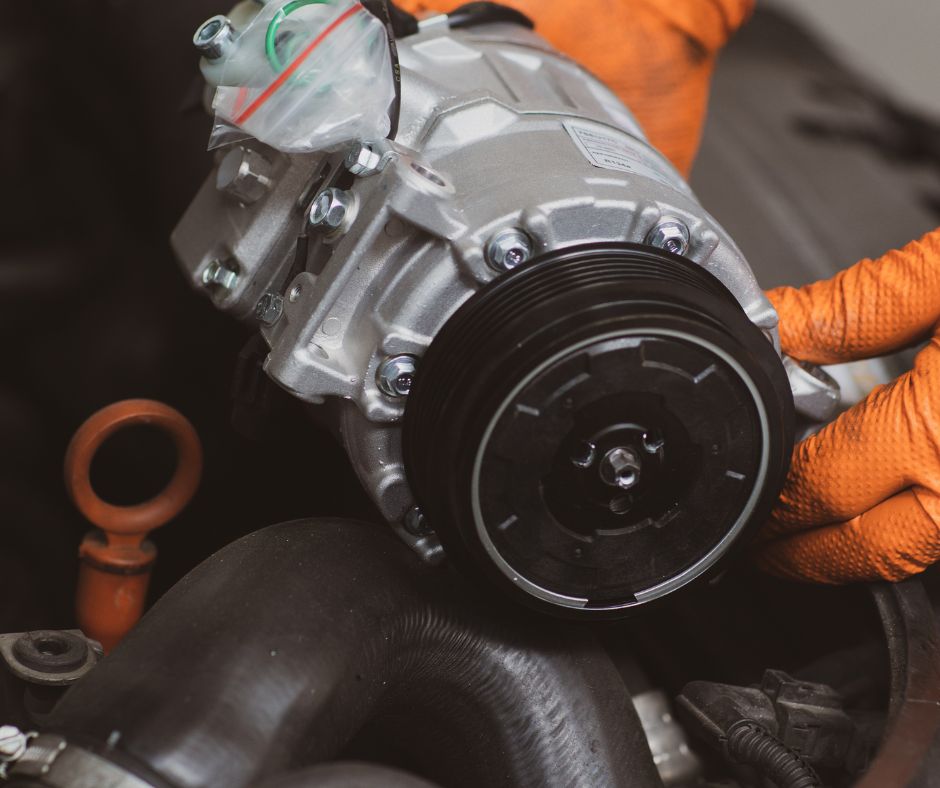We are moving warehouse. Please note Orders placed from 28 January will only be shipped out on 5th February. Dismiss
Skip to content
The AC compressor plays a big role in keeping your air conditioning system running smoothly. Think of it as the heart of the system, pumping refrigerant through the unit to help cool the air inside your home or car. Without it, the whole system struggles, or worse, stops working altogether.
Looking after the compressor properly can save you from expensive repairs down the track. Understanding what an AC compressor does in a car and how to maintain it can save you from expensive repairs and uncomfortable drives.
The AC compressor is like the engine of your air conditioning system, keeping everything running smoothly. It pressurises and circulates refrigerant, allowing the AC to remove heat from the cabin. Without it, your air conditioner wouldn’t work, leaving you stuck with hot, uncomfortable drives.
It is located in the engine bay and connected to the engine via a belt, the compressor makes sure that there’s a steady flow of refrigerant throughout the system. To put what a car AC compressor does in simpler terms, it is like your heart that pumps blood and keeps everything moving, if it stops, so does your AC.
The AC compressor’s role is to take low-pressure refrigerant gas, compress it and send it through the system for heat exchange and cooling.
It affects beyond just your comfort, it also influences:
That’s why regular maintenance is a must. A well-maintained compressor means a more efficient and long-lasting air conditioning system.
Let’s break down exactly what does AC compressor do in a car that keeps the interior cool and comfortable.
The compressor’s main job is to increase the pressure and temperature of the refrigerant to make it easier for the system to remove heat from the cabin.
It moves the refrigerant through the system in a continuous loop, so the cooling process never stops while your AC is running.
Your AC compressor helps control the cooling cycles by consistently cooling air until it reaches the desired temperature inside the cabin.
It works alongside other AC components to extract heat from inside your car and release it outside.
A well-functioning compressor helps keep the system sealed and pressurised, preventing refrigerant from leaking and reducing the risk of AC failure.
On humid days, your windscreen can fog up fast. The compressor helps clear it by removing moisture from the air inside your car.
Keeping your car in good shape is about protecting both your ride’s comfort and your wallet from costly repairs. As we already know what does a car AC compressor do, here’s how to take care of it:
Too much or too little refrigerant can cause problems. Low levels force the compressor to overwork and excess refrigerant can damage the system.
A dirty condenser makes the compressor work harder than necessary, which can cause it to overheat. Keeping it clean helps maintain efficiency.
Even in winter, switch on your AC every now and then. This keeps the system lubricated and prevents seals from drying out.
Since the compressor is belt-driven, worn-out belts can cause it to fail. Check for cracks or damage and replace them when needed.
Leaks can cause your AC to lose cooling power and put strain on the compressor. If you notice weak cooling, strange noises or oily spots near AC components, have it checked.
Using the wrong refrigerant can damage compressor seals and lead to leaks. Always follow the manufacturer’s recommendations.
Clicking, grinding or rattling noises when you switch on the AC could be a sign that your car needs repair. If you hear anything odd, it’s best to get it inspected.
Professional servicing prevents small issues from turning into big, expensive problems. A quick check-up can save you from replacing an entire AC system.

The car AC compressor doesn’t work alone; it’s part of a bigger system and all these parts work together to keep you comfortable while driving. If one fails, the entire system struggles. These parts include:
Converts refrigerant gas into liquid by releasing heat outside the car.
Removes moisture and contaminants from the refrigerant.
Stores excess refrigerant and filters out debris, keeping the AC system running smoothly.
Regulates the flow of refrigerant into the evaporator for efficient cooling.
Absorbs heat from inside the car and cools the air before it blows through the vents.
Engages and disengages the compressor as needed, helping to regulate cooling.
A reliable AC system is all about driving in comfort and the best conditions possible. In this guide, we’ve elaborated on what an AC compressor is in a car and why it’s important. Having a grasp of what’s making up your AC system helps you determine which one isn’t performing like it used to.
Whether you need full AC servicing or a high-quality AC compressor replacement, Oz Cool Auto & Parts is always ready to serve! We also provide expert diagnostics and other AC needs like refrigerant refills.
Book an appointment with us today!